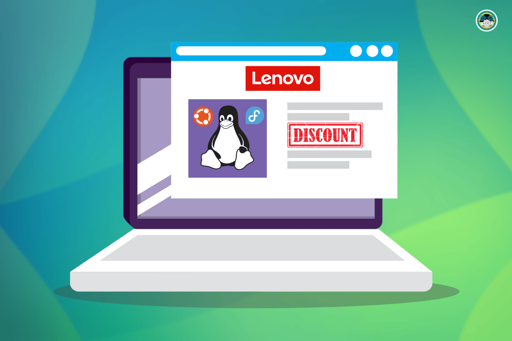At least in the U.S. and Canada, that is.
This was brought to my attention thanks to a Reddit post where a user (presumably a resident of Canada), had posted how Lenovo was shipping laptops with Fedora and Ubuntu at a cheaper price compared to their Windows-equipped counterparts.
Others then chimed in, saying that Lenovo has been doing this since at least 2020 and that the big price difference shows how ridiculous Windows’ pricing is.
When I dug in further, I found out that the US and Canadian websites for Lenovo offered U.S. $140 and CAD $211 off on the same ThinkPad X1 Carbon model when choosing any one of the Linux-based alternatives.
I think these manufacturers could do a better job in marketing these Linux-based alternative operating systems to general consumers, showing them how they can save big when opting for these instead of the pricey and bloated Windows.
Wow $140 USD is a lot for preinstalled windows IMO. 😱
Yeah I didn’t believe that amount, looked it up, and it looks like digital W11 Home keys are $139 USD directly from Microsoft.
I’m surprised manufacturers aren’t getting some sort of license discount.
They are, but likely not passing the savings on.
When Microsoft battled Android to sell their own phones, they demanded a $35 license fee for “Microsoft Patents” on Android!.
AFAIK that was about the same as a Windows OEM license! Just about every Android phone maker folded and agreed to pay!So IDK Microsoft can be very aggressive in their license pricing. There are also different versions of Windows, and a multi language license is AFAIK more expensive.
Still for me it would be absolutely insane to pay that much, as I would just format it anyway, and install Linux. And with Linux I can use whatever language I want!
If I were to guess, I’d say they may get a discount but Lenovo could be reducing their margin to incentivize people away from Windows so they can stop paying out Windows licenses in the future.
That makes the most sense
Yeah, they only gave me like $50 or so off when I told them I didn’t want the Windows license. Granted, it shipped w/ Linux, so they likely still paid for the license, but still.
We had a campaign here several years ago, and $50 was the accepted rate most places.
I don’t think you can legally demand it anymore, but you used to be able to demand that windows was removed, and you were compensated for the price of the license.
Here in EU what made that possible was AFAIK regulation about anti competitive practices.Problem is it’s never Microsoft that pays, it’s always the vendor or retailer.
Exactly. And my understanding is that they pay something close to the retail rate, whereas they get a discounted rate from Microsoft, so they’re getting shafted multiple ways.
deleted by creator
The trick with selling Linux is not telling the user it’s not Windows. I used to refurb old laptops for old ladies. Throw a light version of Linux on there, show 'em the internet, maybe setup email, done. And I never got pestered to come back and fix shit.
My grandmother used Ubuntu for years. I setup autologin and put a Firefox shortcut on the Desktop. The next time a problem cropped up was when the LTS support ended
My parents bought laptops together around 2013 that they still use today, just with new batteries and SSD upgrades.
Windows 10 was already pushing it, I had to do some funky things to stop Windows from overwriting old drivers with newer versions that broke stuff like the trackpads. Now they have Fedora KDE spin. The GUI is similar enough when all you do is use Thunderbird, Firefox, and the File Explorer.
Changing OS was still scary to them, so I just brought over a live USB for them to test drive.
The test drive is brilliant! But for most of the folks I’m talking about, not going to give them a choice that will only confuse them. Not to be the high-handed, know-it-all IT guy, but sometimes you present a solution as a fait accompli. “There ya go! Here’s how it works. Any questions? Enjoy!”
And BTW, YES to you! A fresh $20 battery, an SSD and Linux Light (or similar), new laptop as far as they can tell. We on the same page!
Microsoft essentially created a private sales tax on every computer sold in the world. This is how Bill Gates became extraordinary wealthy.
The US should have won that anti-trust case. If you want to understand how Gates saved Microsoft, read this 1998 investigation that I found in newspaper archives :
HOW MICROSOFT SOUGHT TO GAIN ALLIES AND INFLUENCE IN WASHINGTON
WASHINGTON – Twenty months ago, Rep. Billy Tauzin walked into the office of Bill Gates, chairman of Microsoft, bearing a 10-inch-by-10-inch white box and a warning.
Tauzin, R-La., the chairman of a subcommittee that oversees the telecommunications industry, placed the box on Gates’ desk. Inside was a lemon meringue pie, a reminder of another pie that had been thrown in Gates’ face several weeks earlier by a Microsoft critic.
The message to Gates, the richest man on earth and the leader of the digital world, was blunt: You need to make friends in Washington.
At the time of Tauzin’s visit in early 1998, the Justice Department was contemplating filing its antitrust suit against Microsoft.
“I told him he was being demonized,” Tauzin said in an interview. “I said he had to win the antitrust case in court, but there was also the court of public opinion.”
Gates apparently took Tauzin’s message to heart – with a vengeance. While Microsoft and its executives contributed a relatively modest $60,000 to Republican Party committees in 1997, the company’s contributions in 1998 shot up to $470,000 as part of its overall political contribution of $1.3 million. The 1998 figure included donations to political candidates, with the bulk of the money going to Republicans.
This year, the company’s contributions of nearly $600,000 have been more evenly divided between Republicans and Democrats, according to Federal Election Commission records.
Microsoft’s lobbying, focused on swaying Congress and creating a generally friendlier climate in Washington, has had little if any effect on the current antitrust litigation in U.S. District Court, where the company was dealt a major setback on Friday by Judge Thomas Penfield Jackson’s initial findings that it had used monopoly power to stifle competition.
Rather, the lobbying campaign is a long-term strategic push intended to alter the political terrain where future power struggles will be fought.
Campaign donations were just one element of Microsoft’s multimillion-dollar effort to win allies in Washington. The company also poured millions of dollars into an aggressive public relations and political offensive, hiring an armada of well-connected lobbyists and underwriting the work of research groups, academics and consultants who have made arguments sympathetic to Microsoft’s defense in the antitrust case.
The company’s lobbying budget nearly doubled in 1998 from the previous year, to $3.74 million, according to the company’s lobbying disclosure reports, and is on pace this year to significantly surpass that figure.
Gates and his top lieutenants have made dozens of trips to Washington, cultivating powerful figures in both parties and hiring some of the city’s priciest lobbyists.
Microsoft has retained Haley Barbour, former chairman of the Republican National Committee; Vic Fazio, a former Democratic congressman from California; Vin Weber, a former Republican congressman from Minnesota; Tom Downey, a former Democratic congressman from New York and a close friend of Vice President Al Gore; Mark Fabiani, former special counsel to the Clinton White House; and Kerry Knott, former chief of staff to Rep. Dick Armey of Texas, the House majority leader.
Microsoft has also given hundreds of thousands of dollars to research groups, trade groups, polling operations, public relations concerns and grass-roots organizations. It has financed op-ed pieces and full-page newspaper advertisements, and mounted a lobbying effort against an increase in the Justice Department’s antitrust enforcement budget.
In June, Bill Gates met for lunch with the Republican leaders of the House in the small whip’s room off the House chamber. They discussed Microsoft’s public policy agenda, ranging from exports of encryption software to Internet privacy to antitrust actions, said several participants at the meeting. Knott, now a top official in Microsoft’s Washington office, attended the session.
Eight days later, Armey introduced what he called his “e-Contract,” a list of Republican legislative initiatives that pointedly adopted Microsoft’s view of the role of government antitrust actions, like the one that now threatens to dismantle Microsoft.
“When federal agencies use heavy-handed tactics to target specific companies,” the Republican document states in language that echoes Microsoft’s own, “the real message they send to the market place is this: You could be next.”
Armey’s aides insist that the release of the document was just a coincidence and that Republicans had long opposed aggressive enforcement of antitrust laws. Microsoft officials also denied that they had influenced Armey’s priorities or his language. The package of Republican proposals is still before Congress.
Another Microsoft move on Capitol Hill drew criticism for heavy-handedness.
It is lobbying to trim the antitrust division’s budget brought a flurry of editorial condemnation. The Washington Post said Microsoft’s actions were “a comical caricature” of a company trying to bully its way through Washington."
One Justice Department official said, “Even the mob doesn’t try to whack a prosecutor during a trial.”
https://archive.nytimes.com/www.nytimes.com/library/tech/99/11/biztech/articles/07strategy.html
The reason why Apple displaced Microsoft as the richest company in the world? Billionaire Tim Cook is using tactics that are even more predatory. If you make any purchase with an app, Apple takes a 30% cut. And if the app makers refuse, Apple murders their business by kicking them out of the App store.
They banned the videogame Fortnite because the developers tried to resist:
These tech billionaires are economic tyrants. They want to use technology in order to enslave consumers and workers. They want customers to have no choice. They want their suppliers to be powerless. They want workers to have a limited number of huge employers. Their dream is absolute power over the market.
Fuck economic tyrants.
Only idiots kiss their ass.
One time I asked my brother how he installed iPhone apps that aren’t in the app store. He just said you can’t ???
It’s crazy that “lobbying budget” and “buying lobbyists” is a thing said in the openness and not illegal. Thanks for sharing this report, it’s a great (disgusting) read.
This is no news. Lenovo has been offering a variety of windows or no OS for years.
Yes, but they usually came at the same price.
What? What kind of raw deals do you guys get?
In Europe I could always return the Windows licence and get over 100€ back.
In the US, I asked before buying, and they gave me a $50 or so discount. It was better than nothing, so I took it.
AFAIK that ended about 10 years ago, due to some legal technicality.
deleted by creator
That’s not correct at all. Did you visit lenovo.com lately?
This is fair, and might advertise a bit just how expensive Windows still is.
Have other companies been doing this before, I’ve heard of Dell selling Linux laptops but not sure if they’re cheaper.
They’ve done that on and off for ages, and the ones being offered with Ubuntu here are mostly pretty expensive or else not so interesting. I’ve been content to buy older Thinkpads and self-install Debian for my past several laptops. I was somewhat tempted by recent Ideapad Yogas but resisted, and since then, prices have gone up, whether due to tariffs or whatever else.
Dell used to have done this for a while until one day they decided not to. They pre-installed with Ubuntu if I recall.
Haven’t they been doing this for years?






